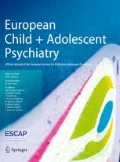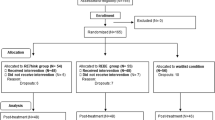Abstract
Emotional disorders are the most prevalent mental health conditions affecting children and adolescents. Thus, it becomes essential to develop and test early intervention strategies that are accessible, attractive, and can effectively improve their emotional functioning. A randomized control trial compared the prevention effects of the REThink therapeutic game to those of a standard face-to-face prevention program, and a waitlist which was transformed at follow-up into care as usual. Out of 142 healthy children and adolescents who completed the intervention stage, 137 (mean age: 12.84, SD: 1.97) completed a follow-up assessment measuring emotional symptoms, depressive mood and emotion regulation. We also tested potential moderators of its long-term effects, such as parental psychological control, parent attachment and childhood trauma. Our results highlighted the fact that the REThink intervention had a durable impact on the children’s mental health and their ability to regulate their emotions. Moreover, we found that trauma, parent psychological control and parent attachment moderated the maintenance of the improvements. Future research needs to further document how to personalize the game and prevention program components to better address the characteristics of the youths at risk for mental health problems. ClinicalTrials.gov NCT03308981, from 13.10.2017.


Similar content being viewed by others
Data availability
The data that support the findings of this study are available from the corresponding author, upon reasonable request.
Code availability
Not applicable.
References
WHO Regional Office for Europe (2018): Factsheet for World Mental Health Day 2018. In: WHO. https://www.euro.who.int/__data/assets/pdf_file/0005/383891/adolescent-mh-fseng.pdf. Accessed 23 July 2021
David OA, Costescu C, Cardos R, Mogoaşe C (2020) How effective are serious games for promoting mental health and health behavioral change in children and adolescents? a systematic review and meta-analysis. Child Youth Care Forum 49(6):817–838. https://doi.org/10.1007/s10566-020-09566-1
Merry SN, Stasiak K, Shepherd M, Frampton C, Fleming T, Lucassen MFG (2012) The effectiveness of SPARX, a computerised self help intervention for adolescents seeking help for depression: randomised controlled non-inferiority trial. BMJ 344:e2598. https://doi.org/10.1136/bmj.e2598
Ellis A (1994) Reason and emotion in psychotherapy. Birch Lane, Secaucus
David OA, Predatu RM, Cardoș RAI (2018) A pilot study of the REThink online video game applied for coaching emotional understanding in children and adolescents in the therapeutic video game environment: the feeling better resources game. J Evid-Based Psychother 18(1):57–67. https://doi.org/10.24193/jebp.2018.1.5
David OA, Cardoș RAI, Matu S (2019) Is REThink therapeutic game effective in preventing emotional disorders in children and adolescents? Outcomes of a randomized clinical trial. Eur Child Adolesc Psychiatry 28(1):111–122. https://doi.org/10.1007/s00787-018-1192-2
David O, Cardos RAI, Matu S (2019) Changes in irrational beliefs are responsible for the efficacy of the REThink therapeutic game in preventing emotional disorders in children and adolescents: Mechanisms of change analysis of a randomized clinical trial. Eur Child Adolesc Psychiatry. https://doi.org/10.1007/s00787-018-1195-z
David OA, Predatu R, Maffei A (2020) REThink online video game for children and adolescents: effects on state anxiety and frontal alpha asymmetry. Int J Cogn Ther 14(2):399–416. https://doi.org/10.1007/s41811-020-00077-4
David OA, Predatu R, Cardoș RAI (2021) Effectiveness of the REThink therapeutic online video game in promoting mental health in children and adolescents. Internet Interv 25:100391. https://doi.org/10.1016/j.invent.2021.100391
Yap MBH, Pilkington PD, Ryan SM, Jorm AF (2014) Parental factors associated with depression and anxiety in young people: A systematic review and meta-analysis. J Affect Disord 156:8–23. https://doi.org/10.1016/j.jad.2013.11.007
Twisk JWR (2013) Applied longitudinal data analysis for epidemiology: a practical guide, 2nd edn. Cambridge University Press, Cambridge. https://doi.org/10.1017/CBO9781139342834
Vernon A (1998) The PASSPORT program: A journey through emotional, social, cognitive, and self-development, grades 9–12. Research Press, pp. xiii, 27
Goodman R (1997) The strengths and difficulties questionnaire: a research note. J Child Psychol Psychiatry 38(5):581–586. https://doi.org/10.1111/j.1469-7610.1997.tb01545.x
Goodman R, Meltzer H, Bailey V (1998) The strengths and difficulties questionnaire: A pilot study on the validity of the self-report version. Eur Child Adolesc Psychiatry 7(3):125–130. https://doi.org/10.1007/s007870050057
MacDermott ST, Gullone E, Allen JS, King NJ, Tonge B (2010) The Emotion Regulation Index for Children and Adolescents (ERICA): a psychometric investigation. J Psychopathol Behav Assess 32(3):301–314. https://doi.org/10.1007/s10862-009-9154-0
Hughes EK, Gullone E, Watson SD (2011) Emotional functioning in children and adolescents with elevated depressive symptoms. J Psychopathol Behav Assess 33(3):335–345. https://doi.org/10.1007/s10862-011-9220-2
Ellis, L. K. (2002). Individual Differences and Adolescent Psychosocial Development. https://scholarsbank.uoregon.edu/xmlui/handle/1794/26008
Ellis L, Rothbart M (2001) Revision of the early adolescent temperament questionnaire. Poster Present Biennal Meete Soc Res Child Dev. https://doi.org/10.1037/t07624-000
Neamtu GM, David OA (2016) Coaching emotional abilities in fostered adolescents through rational emotive and cognitive-behavioral education: efficacy and mechanisms of change of using therapeutic stories. J Evid-Based Psychother 16(1):33–56
Barber BK (1996) Parental psychological control: revisiting a neglected construct. Child Dev 67(6):3296–3319. https://doi.org/10.2307/1131780
Gullone E, Robinson K (2005) The inventory of parent and peer attachment-revised (IPPA-R) for children: a psychometric investigation. Clin Psychol Psychother 12(1):67–79. https://doi.org/10.1002/cpp.433
Armsden GC, Greenberg MT (1987) The inventory of parent and peer attachment: Individual differences and their relationship to psychological well-being in adolescence. J Youth Adolesc 16(5):427–454. https://doi.org/10.1007/BF02202939
Sachser C, Berliner L, Holt T, Jensen TK, Jungbluth N, Risch E, Rosner R, Goldbeck L (2017) International development and psychometric properties of the Child and Adolescent Trauma Screen (CATS). J Affect Disord 210:189–195. https://doi.org/10.1016/j.jad.2016.12.040
Rausch JR, Maxwell SE, Kelley K (2003) Analytic methods for questions pertaining to a randomized pretest, posttest, follow-up design: the Official Journal for the Society of Clinical Child and Adolescent Psychology. Am Psychol Assoc 32(3):467–486. https://doi.org/10.1207/S15374424JCCP3203_15
Comer JS, Kendall PC (eds) (2013) The Oxford handbook of research strategies for clinical psychology. Oxford University Press, Oxford, pp 459–xvi. https://doi.org/10.1093/oxfordhb/9780199793549.001.0001
Lord FM (1967) A paradox in the interpretation of group comparisons. Psychol Bull 68(5):304–305. https://doi.org/10.1037/h0025105
Kim H-Y (2015) Statistical notes for clinical researchers: Post-hoc multiple comparisons. Restor Dent Endod 40(2):172–176. https://doi.org/10.5395/rde.2015.40.2.172
Goss-Sampson MA (2018) Statistical analysis in JASP: a guide for students. version 2, October 2018.
JASP Team (2021). JASP (version 0.14.3) [computer software].
Corp IBM (2019) Released 2019. IBM SPSS statistics for windows, Version 260. IBM Corp, Armonk
Zayeni D, Raynaud J-P, Revet A (2020) Therapeutic and preventive use of video games in child and adolescent psychiatry: a systematic review. Front Psych. https://doi.org/10.3389/fpsyt.2020.00036
David OA, Magurean S, Tomoiagă C (2022) Do improvements in therapeutic game-based skills transfer to real life improvements in children's emotion-regulation abilities and mental health? A pilot study that offers preliminary validity ofthe REThink in-game performance scoring. Frontiers in Psychiatry 13:828. https://doi.org/10.3389/fpsyt.2022.828481
David OA (2019) The rational parenting coach app: Rethink parenting! A mobile parenting program for offering evidence-based personalized support in the prevention of child externalizing and internalizing disorders. J Evid Based Psychother 19(2):97–108
Funding
This work was supported by two grants awarded to Oana A. David from the Romanian National Authority for Scientific Research, CNCS-UEFISCDI [grant numbers PN-II-PT-PCCA2013-4–1937 and PN-III-P2-2.1-PED-2019–3837].
Author information
Authors and Affiliations
Corresponding author
Ethics declarations
Conflict of interest
On behalf of all authors, the corresponding author states that there is no conflict of interest.
Ethical approval
Ethical approval for the study was obtained from the Institutional Review Board at the author’s affiliated institution.
Informed consent to participate/to publish
Informed consent (including the processing of personal data according to EU regulations) to participate/to publish was obtained from the participants’ parents and from the school principal.
Rights and permissions
About this article
Cite this article
David, O.A., Fodor, L.A. Are gains in emotional symptoms and emotion-regulation competencies after the REThink therapeutic game maintained in the long run? A 6-month follow-up. Eur Child Adolesc Psychiatry 32, 1853–1862 (2023). https://doi.org/10.1007/s00787-022-02002-w
Received:
Accepted:
Published:
Issue Date:
DOI: https://doi.org/10.1007/s00787-022-02002-w




